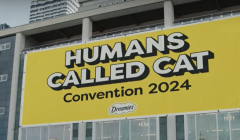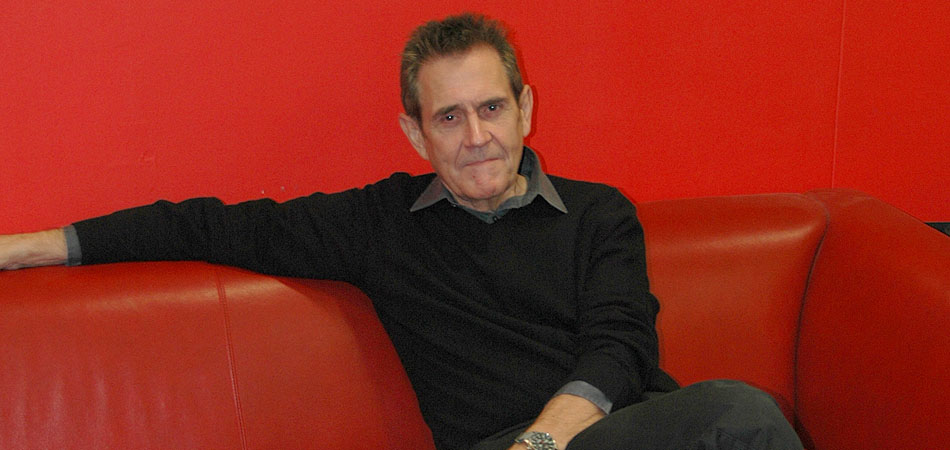
Dreamies investigation proves that the treats are irresistible to cats
The campaign by Adam&EveDDB concludes that the only cats who don’t love the pet treat are human Cats
Dave graduated from the Pratt Institute, New York, majoring in Advertising before going to work in Madison Avenue. Dave has founded several of his own agencies including GGT and Bainsfair Sharkey Trott. If he’s not writing ads he’s blogging, tweeting, and giving talks at industry events


Tom Holmes talks to Dave Trott, Chairman of The Gate London.
Dave graduated from the Pratt Institute, New York, majoring in Advertising before going to work in Madison Avenue.
Dave has founded several of his own agencies including GGT and Bainsfair Sharkey Trott. If he’s not writing ads he’s blogging, tweeting, and giving talks at industry events.
He is author of Creative Mischief.
Dave Trott: Nominally, I’m Chairman, but I don’t really think I’m conventional Chairman material.
I think I’ll just be doing what I’ve always done: writing ad campaigns, training youngsters, doing talks about advertising, writing articles, meeting clients I like, being the bridge between the strategic and the creative, that sort of thing. And generally championing the agency on a wider basis.
I won’t suddenly start smoking cigars and falling asleep in meetings.
Dave Trott: We’ve put together a broad, mass market consumer agency (CST) with a strong, financial specialist agency (The Gate) to create a really strong consumer-financial agency. We probably have better credentials in this area than any other agency in town.
But it’s also led by ex-clients, so we’ve built up a real commercial mindset which sits nicely with our Predatory Thinking approach. And now we are being chosen for new opportunities in services, utilities, FMCG and technology.
Dave Trott: Predatory Thinking.
Most agencies think and act as if advertising existed in limbo.
Their approach is “The answer is brand now what’s the question?”
As if every consumer was waiting to hear about them.
Unlike them, our start point is to isolate exactly where the client’s new business is going to come from, and how to make that happen.
The answer may be brand, but it may be something else.
Before we can solve an advertising problem we have to solve a business problem.
Dave Trott: I was trained in New York.
The advertising environment, like everything else, is more competitive.
You have to be able to see a definite reason for everything you do, and to predict a definite result.
London advertising is more hit-and-hope, more decorative by comparison.
In New York, advertising is a business tool not just decoration.
In business, you are Predator or Prey
Predatory Thinking starts with a market truth: if you want people to do something, they have to stop doing something else.
Whether it is people’s time, their attention, or their money you want – these are limited resources – you are in a zero sum game. If you want more, someone or something else is going to get less.
Put another way, if you aren’t 100% focused on winning your share, someone else will steal it from you.
In today’s business environment, never has it been truer that you are either predator or prey.
Predatory Thinking delivers clarity.
Predatory Thinking is at the heart of all we do.
Because it works.
Because it helps us look at business problems with incisive clarity.
By identifying who or what will lose out – your prey – and what you have in your armoury to beat them, we unearth the right Predatory Thought for your business: the idea that will drive the change in behaviour that will help you achieve your objective.
Two things distinguish successful Predatory Thinkers. First, they put themselves at an unfair advantage by choosing their own territory and rules of engagement. Second, they align all their tools and talents to focus on their purpose.
In this way they outmanoeuvre and outwit their competition, change behaviour and put their businesses on a clear and visionary path to success.
And when companies, people and brands have a clear purpose that inspires and engages them, then, rather than look backwards, or inwards, they move forward fuelled with passion and energy. They develop exciting, positive and real business momentum.
Most agencies fit into one of two categories: one-dimensional specialising in one media type, or two-dimensional with both above and below the line.
The Gate London has more: we offer all the perspectives needed to solve business problems, from our business strategy consultancy to our strategic and creative communications expertise to our media business.
We use all these talents simultaneously to identify business problems and generate ideas. We look at problems and ideas from all the angles at once. By getting all the disciplines round the table right from the start of a project, we can look at being predatory not just in what you say, but in what you do, how you communicate, and where.
It is this multi-dimensional approach that unleashes Predatory Thinking to create ideas that truly come alive in your communications to drive genuine business success.
Dave Trott: National Accident Helpline is a good example.
They are in the direct response business, so you know immediately whether or not the ads are working.
We isolated a sector no one else was targeting, people who were too insecure to claim.
We created a character: the underdog.
We took that right through from TV, to press, to online, to call centres.
The campaign generated 30% YOY growth. Crucially, this growth has come at a lower cost, with cost per enquiry down 8% across the same period. And we’ve tripled brand searches.
NS&I are another good example.
When we started doing their advertising they were £1.5 billion behind target.
12 weeks after our campaign ran they were £1.5 billion ahead of target and had to pull the advertising.
I like advertising with definite, measurable results.
Dave Trott: Many marketing people unthinkingly follow consumer insights.
A consumer insight into your market will usually be an insight into the whole sector.
So any advertising using this will often grow the whole sector.
Naturally, the one who benefits most will be the market leader.
And there’s only one market leader in any market.
So everyone else, by doing that sort of advertising, is growing the market for the market leader, rather than taking market share for themselves.
Clients like that ought to behave like challenger brands, they need a dose of predatory thinking.
Dave Trott: My two main heroes are both dead.
Bill Bernbach invented good advertising in New York in the 1960s.
Before him advertising was like the TV series Mad Men: patronising, monotonous, repetitive, boring.
I learned a lot, studying Bernbach when I was in New York.
Then, when I came back to the UK, I learned from studying John Webster at BMP.
His taught me advertising that caught on with the public and got repeated in the streets.
I learned that the best advertising creates its own word of mouth.
And that’s all free media.
Dave Trott: I think everyone looks for a way to avoid thinking and consequently responsibility.
Most marketers just want a formula they believe will take all the risk out of advertising.
So most of them just use the same methods.
All this does is ensure that everyone comes up with the same answers, and all advertising looks the same.
So most of it doesn’t work.
The demise of UK advertising is directly linked to the demise of UK entrepreneurial spirit.
Dave Trott: Start with the business problem to be solved, then work out what part advertising can play in that.
What’s the role for advertising?
The tighter the definition, the better the solution.
Then look for the best solution, don’t be seduced by the glamour of the ad agency.
But most clients don’t do that, they pick the glamorous agency rather than the best solution.
That’s like going shopping and choosing the best shop instead of buying the best product.
After you walk out of the door, you’re stuck with it.
Dave Trott: To paraphrase Winston Churchill “Pitching is the worst way to pick an agency except for all of the other ways which have been tried.”
Dave Trott: If you love the work it shows, it just presents itself and you’re proud to be part of it.
If I don’t love the work I don’t present it, because it shows.
Dave Trott: I knew I wouldn’t be able to sit down and write a 300 page book, so I wrote it as a series of blogs, 2 pages a day.
That way I had feedback every day, on what was good and bad, what worked and what didn’t.
I ended up with 600 pages and just picked the best 300.
And in the process, I learned how to write.
Dave Trott: The books I always recommend to students are ‘Positioning: The Battle For Your Mind’ by Ries and Trout, and ‘The Art of Advertising’ by George Lois.
Both books are over 20 years old, but no one’s written anything as clear and simple and powerful yet.
Plus I have a new book out on May 23rd: Predatory Thinking.
Dave Trott: It’s like the last line of the movie ‘The Wild Bunch’.
One of the Wild Bunch tries to persuade an old member of the gang, who’s since joined a posse, to rejoin the gang.
He says “It’s not as good as it was, but it’ll do.”
Dave Trott: When I was 16 I left school and got a job as an apprentice in a factory.
What I learned was the worst day in advertising beats the best day in a factory.
Dave Trott: Both my children had really good ads running at the same time.
My son, who’s a copywriter at Grey, had a really good online ad for Brother printers.
My daughter, who’s an art director at BMB, had a really good TV campaign for Dairylea.
I didn’t have to pretend to like them, they were actually both good.
I feel like I did my job, as a creative director and a parent.
Dave Trott: The new media gurus will again predict that whatever the new thing is, it’ll mean the death of traditional advertising.
Then in 2014, when it’s failed, they’ll take it all back again and say that wasn’t what they really meant.
Dave Trott: I spoke to St Martins students last week, and every year I do several sessions at Watford, which is consistently the best purely advertising course.
Also I just did the keynote speech to 2,000 people at the SEO conference.
And I’m due to do the keynote speech next month at the CMA conference.
Then I’m doing a talk on creativity at Google HQ in London.
Then in January I’m doing a speech in New York for the One Club, who are posthumously inducting John Webster into their Hall of Fame.
Then in March, another talk to young planners at the Account Planning Group.
Looks like you need to create a Creativebrief account to perform this action.
Create account Sign inLooks like you need to create a Creativebrief account to perform this action.
Create account Sign in